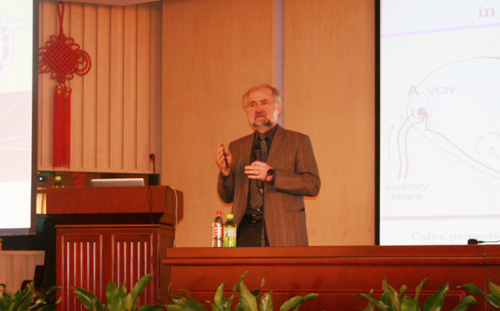Nobel Laureate Erwin Neher Visits Institute of Biophysics

Professor Erwin Neher, winner of the Nobel Prize in Physiology or Medicine 1991 visited the Institute of Biophysics, Chinese Academy of Sciences at the invitation of IBP Director Professor Xu, Tao in the afternoon of April 5, 2010.
Professor Neher delivered a presentation at IBP during his visit. His talk, titled “A new view on the vesicle cycle: What is the tate-limiting step during sustained synaptic activity” attracted scientists and graduate students not only from IBP but also from Beijing University, Tsinghua University and other CAS institutes. In his one hour presentation, Professor Neher discussed about the regulation mechanism of synaptic transmission by endocytic process with patch clamp and related techniques. He explained the replenishment of the fast-releasable pool is inhibited by inhibiting the endocytosis with various agents such as dynasore. The refilling process is dominated by the clearance of exocytic sites, in contrast to the general belief that it is regulated by the recruitment of new vesicles. Professor Neher also showed that the speed of synaptic depression increases when endocytosis is inhibited, indicating that it is of physiological significance.
Professor Erwin Neher is the Director of the Department of Membrane Biophysics, Max Planck Institute of Biophysical Chemistry, Germany. He and another German scientist Bert Sakmann jointly won the Nobel Prize in Medicine or Physiology in 1991 for their collaborative work on cell communication mechanism. Their research provided a clearer explanation of the cause of diabetes, cystic fibrosis, epilepsy and other neuromuscular disorders. They developed the patch-clamp technique, a new method for observing the tiny electrical currents produced in ion channels (tube-like passageways from the inside to the outside of a cell.
Professor Erwin Neher was the first international scientist who awarded the Chinese Academy of Sciences Einstein Professorship. As one of the two Chairmen of IBP’s international advisory committee, Professor Neher had paid several visits to IBP and exchanged with researchers. He witnessed and impressed by the rapid development of the institute during recently years. He expressed his hope to develop further collaboration with IBP in the future.

